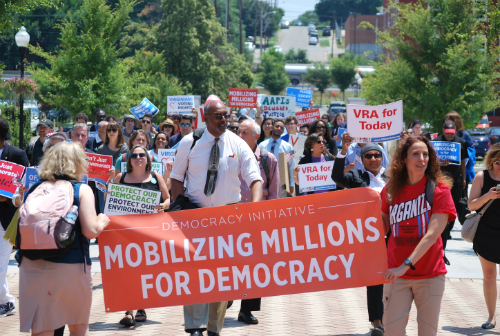Today marks the 50th anniversary of the Voting Rights Act, one of the most historic and landmark pieces of legislation in this country. Rewind to a month ago, when I boarded the bus in the early morning and arrived in Roanoke, surrounded by hundreds on the two-year anniversary of the crushing Shelby County v. Holder Supreme Court decision. Speakers and organizations at the rally ranged from the Sierra Club and NAACP, to the National Center for Transgender Equality and the ACLU, calling on local Congressman Bob Goodlatte to hold hearings and #RestoreTheVRA. The hugely diverse representation demonstrates how coalition building makes us stronger, and even more so, how much we all need a fair democracy to fight for the causes we are most passionate about.
Yet today, the progress that was made for equal voting rights on the backs of Civil Rights activists from the ‘60s is now crumbling. The Supreme Court decision in 2013 gutted Section 4 and the preclearance provision, opening the floodgates for harsher voting rights restrictions in states across the country – including eradicating same-day registration, early voting days, and placing new restrictions on voter registration drives. In Virginia, where the rally was held, new photo ID laws prevented almost 200,000 active voters from casting a ballot in the most recent election. Considering that the 2014 Senate election was decided by a 0.6 percent margin of only 12,000 votes, it is likely that the voter suppression may have influenced the outcome.1
All of these restrictions disproportionately affect low-income communities, people of color, young people and the elderly, who are all less likely to have easy access to a government issued ID or have the flexibility to take time off from work to vote. Barriers for marginalized communities continue to pass through state administrations long before active citizens reach the voting booth curtains, perpetuating systemic issues of inequality.
As many as 25 percent of African-Americans do not possess a current and accepted form of government-issued photo ID,2 while approximately 68 percent live within 30 miles of a coal-fired power plant.3 "Communities that are on the front lines of the climate crisis and facing the worst environmental injustices are the same ones experiencing voter suppression and racial discrimination. Voter suppression holds communities back from truly participating in our democracy addressing pressing issues like the climate crisis,” Sierra Club president Aaron Mair said. Recognizing the intersection of our movements is crucial to building power and supporting the change we want to create for a just and sustainable democracy.
Students and youth can help propel this effort by hosting voter registration drives on campus or in their communities and educating people about their state's laws. Allowing student IDs to be used for proof of identification and opening up online voter registration - which many states have already begun to do - are all tangible efforts to take back the rights and make our democracy fair and easily accessible to all people. You can take action by signing the online petition telling Congress to restore the Voting Rights Act, signing up for updates from the Democracy Program, and organizing your university body to pressure local legislators and administration to take a bold step in the right direction.
The success of the Roanoke rally is just one step in the fight to restore the Voting Rights Act to its full strength. As the climate crisis heats up, so does the need to protect our democracy. Students and young voters are ready and engaged; the question is: how will you take a stand for justice?
